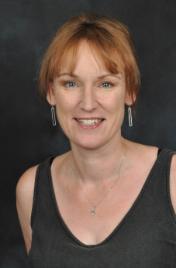Julie vocal about social justice as she leads Speech Pathology
Published on 29 October, 2012
Talking to Julie Hickin about her academic specialty of Speech Pathology soon involves a broader discussion about educational access and social justice.
Julie grew up as the daughter of a coal miner in low socio-economic family circumstances in a town called Coalville, near Leicester in the English Midlands.
As the Associate Professor and Discipline Lead for Speech Pathology at CQUniversity, she's now moved her family to Rockhampton - located at the threshold of Australia's mining boom - but has noticed a particular difference.
"We never heard the term 'rich miner' where I grew up," she said. "My dad did the tough work on his side down a narrow mineshaft with a pick and it's good to know that Aussie miners now earn good money in recognition of their own difficult and sometimes dangerous work conditions."
When thinking about the term Speech Pathology, some may recall seeing The King's Speech, the movie about the stammering regent cured by Australian Lionel Logue, who played a major role in drawing patronage to the Royal College of Speech and Language Therapists.
However, while speech pathologists may do some accent modification, they are actually involved with the full range of speech and swallowing disorders from the cradle to the grave.
For example, they can advise on feeding and weaning issues experienced by babies suffering a cleft lip or palate. They often help stroke or head injury victims overcome communication difficulties, a condition known as aphasia.
Speech pathologists also work to restore communication to cancer patients with cancer of the head and neck, as cancer of the tongue potentially affects speech intelligibility whereas cancer of the larynx affects the ability to produce voice.
Julie believes strongly in equity of access to education and society. For this reason she is already working with academic colleagues to develop teaching resources for students and health professionals working in remote and rural areas, and in particular with Indigenous clients. To this end, Julie and her colleagues Associate Professor Monica Moran and Pro Vice-Chancellor (Indigenous Engagement) Professor Bronwyn Federicks* were announced as recipients of one of CQUniversity's Scholarship of Learning Teaching (SoLT) grants to develop an Indigenous health training resource.
Julie has recently gained praise from her peers overseas and throughout Australia.
In September, she led a symposium on 'New IT Developments in Aphasia Therapy' and chaired a session on 'Memory Impairments and Aphasia' during the British Aphasiology Society Biennial International Therapy Symposium in London. In October, she gave a presentation on therapy for very high level aphasia entitled 'To the Sentence and Beyond' during the International Aphasia Rehabilitation Conference in Melbourne.
"I have two invitations to collaborate with other Australian universities as a direct result of these conferences, as well as positive feedback from delegates from around the world," Julie says.
* Professor Bronwyn Fredericks is Pro Vice-Chancellor (Indigenous Engagement) and BMA Chair in Indigenous Engagement


